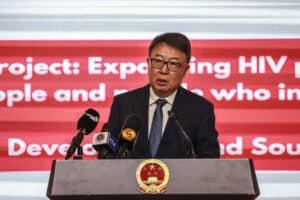Taiwanese are divided on unity with China but agree on one issue: preserving their democratic system.

People in Taiwan are divided over whether China and Taiwan should be united and become one country, but they are united on one issue – to let their democracy stay.
Political analyst Prof Dirk Kotzé said it was not surprising that some Taiwanese citizens fear the merging of the two nations could not turn out well for them because of the Hong Kong experience, where China scrapped the two-systems policy when it took over.
Kotzé, from the University of South Africa’s political sciences department, said Taiwan was in a quandary because it remained deeply isolated diplomatically, while it hoped for US support if attacked by mainland China.
But its technology-based economy is its global trump card for economic survival although the semiconductor industry also interested China.
ALSO READ: China says halted nuclear arms talks with US over Taiwan weapons sales
Kotzé said Beijing put massive pressure on many countries, including South Africa, to isolate Taiwan, which is why Eswatini is the only country that has diplomatic relations with Taiwan in Africa.
Over the years, Taiwanese state officials have expressed fears that China’s plan to take over and control Taiwan would ultimately destroy its democracy.
Politicians in Taipei believe that China would not only end democracy in Taiwan, but that Beijing would impose its dictatorship on the island nation.
But during a visit by a group of international journalists hosted by the Taiwanese department of foreign affairs, The Citizen spoke to some Taiwanese to hear what they think of the policy of one China or two Chinas.
What citizens said
There were mixed views on the issue.
Speaking to people at the busy Nanjing W Road in Taipei City and the nearby flea market, young and old were asked whether they would like to see China and Taiwan talk to each other and not go to war.
A 75-year-old woman operating a clothing and goods stall said the two countries should unite.
“We can’t fight with China, we are one country, we are the same nation. I don’t know what the young generation thinks. They have their own ideas.
ALSO READ: Taiwan ready to reopen Eastern Cape factories
“They agree with independence and they want to be separate from the Chinese,” she said.
The woman, who preferred to remain anonymous, said China and Taiwan should keep talking to each other to understand each other.
“That may take 10 years, but we should talk and not fight. We are close to each other geographically. We must talk and agree to keep our system of democracy and to keep their system there,” she said.
While she did not mention the socialist system in China, she insisted on a united country with dual ideological systems, with communism for China and democracy for Taiwan.
“We can live in this condition, China can keep theirs and we keep ours, but as one country. There is no need for these two countries to go to war with each other,” she said.
A 60-year-old Taiwanese man of Japanese descent said he loved both countries and war was unnecessary. “We are happy with our country, I like Taiwan and I also like China,” he said.
But Maria Anabel Devera Sagatinto, who is in her 50s, was bold in her view that the status quo must remain.
ALSO READ: Trump says Taiwan ‘should pay’ US for defence against China
She wants China and Taiwan to remain separate with each enjoying its own sovereignty. “Taiwan has democracy, China is a communist country, maybe it’s not good.
“In a democracy everybody goes where they want to go freely and does what they like. It’s freedom in Taiwan, we like our freedom,” Sagatinto said.
A pensioner, John Huang, 70, said whatever China and Taiwan decided, to separate or unite, for any change to happen, it must have the consent of the people so a referendum was a good idea.
“But no war, no war, just talking. We want peace, peace is very important, war is destructive, not good,” Huang said.
Cindy Hsu, 43, a resident of Taipei who was relaxing in the square at the flea market, said Taiwan and China should remain two different countries.
“I don’t like China, it’s not my country,” she said.
But when she was asked if the two countries should be involved in a war to resolve their differences, she said: “I don’t want war, I just don’t like China.”
People fear change
Kotzé said the reaction of ordinary people was mixed because they were looking at their personal circumstances in anticipation of what might happen in the event of war, or if China took over Taiwan.
“Some fear the change that will come with one China. They fear what happened in Hong Kong, where China decided to scrap the two systems approach.”
Kotzé said for Taiwan, it was more about its existence as a sovereign state.
Taiwanese were concerned about whether the US would defend them if China invaded.
The fact that the US had instructed Taiwan to ban the export of semiconductors to China was an indication that this matter also played a role in the tension between Taiwan and the mainland, he added.






